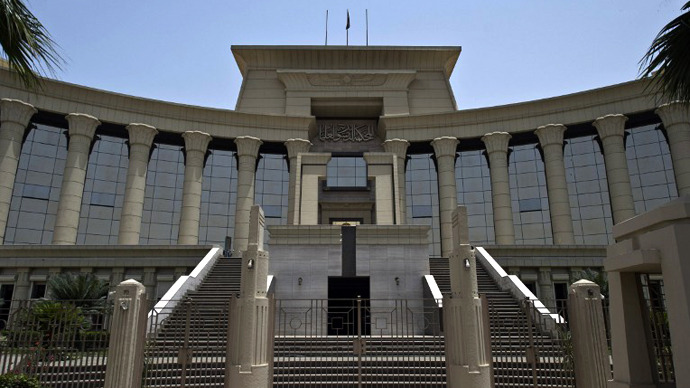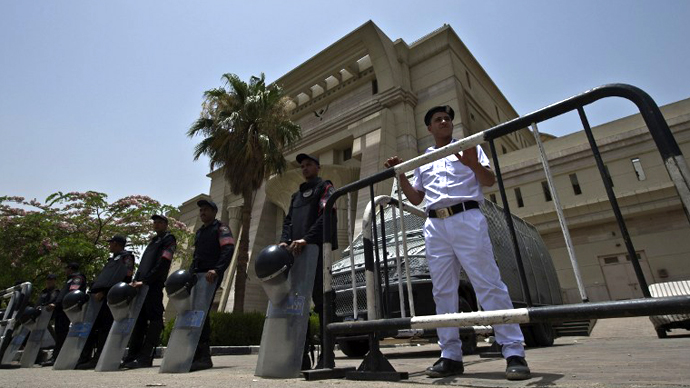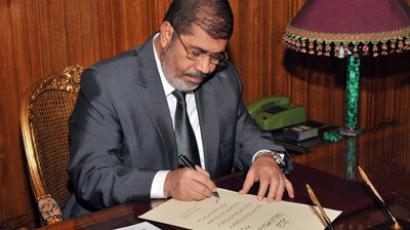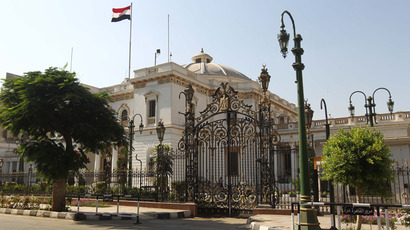Egypt’s court rules Islamist-dominated Senate and constitution panel illegal

Egypt’s top court has invalidated the upper house and the panel that drafted the country’s new constitution. The Senate though will only be dissolved after elections, the court said in a ruling that is likely to deepen Egypt’s political instability.
The Supreme Constitutional Court (SCC) ruled on Sunday that the
laws governing the election of the Islamist-dominated Senate, or
Shura Council, and the constitution panel were illegal.
The court said that the Shura should remain in place until a new
parliament is elected, but it would reportedly have no
legislative authority. So far, no date has been set for the vote.
However, earlier Egyptian President Mohamed Morsi said that
elections could begin in October.
Later in the day, the presidential office stated that the Shura
Council “will continue in its full legislative role until
power is transferred to the new assembly,” reported
Naharnet.com.
Under the constitution, the Council, or the upper house, cannot be dissolved until a lower house is elected, Egyptian Ahram news agency pointed out. But members of the lower house, the People’s Assembly (also called the House of Representatives), had been elected under the same law as the Shura members. The Assembly was dissolved in June 2012 after the SCC deemed that law invalid.
For several months after the dissolution of the Assembly, Egypt lived without the parliament until November last year when president Morsi issued a constitutional declaration giving Shura Council – historically a powerless body – authority to make laws. The declaration also stated that no authority could dissolve the council as well as the constitution-drafting assembly.
Back then, the move yet again threw the post-revolution country into a fresh wave of violent opposition protests and met strong criticism from Egypt’s top judges who demanded that the president reversed the decision.

Both the Shura Council and the constitutional panel were touted by Islamist President Morsi as examples of Egypt’s new democracy. It is not quite clear yet what impact Sunday’s court ruling will have and whether it will affect the constitution ratified in December by a referendum and whether the Council’s earlier decisions will be overturned.
Some members of the Egyptian opposition believe the verdict is unlikely to have a serious effect on the political situation.
Essam El-Erian, a senior member of the Muslim Brotherhood's Freedom and Justice Party and a Shura Council member, suggested that the ruling could lead to a reduction of the Council’s four-year term, cites Ahram.
Former lawmaker, Ziad El-Elemy from the Egyptian Social Democratic Party criticized the court’s ruling as being several months late.
"Slow justice is great injustice. The delay of the verdict
makes it hard to implement. The Shura Council will remain in
place until after elections for the House of the Representatives.
And the Constituent Assembly is invalid, but the constitution
will remain because it was ratified by a national
referendum,” he twitted, as cited by the Egyptian news
agency.
The confrontation between Morsi and the country’s judiciary has been ongoing since his election last June. His supporters staged protests demanding to clear the courts of loyalists of ousted President Hosni Mubarak. Morsi’s opponents accused the president of trying to fill the posts with his own loyalists. The court overturned several of Morsi’s decisions and suspended the parliamentary elections that the president had planned to hold in April.














